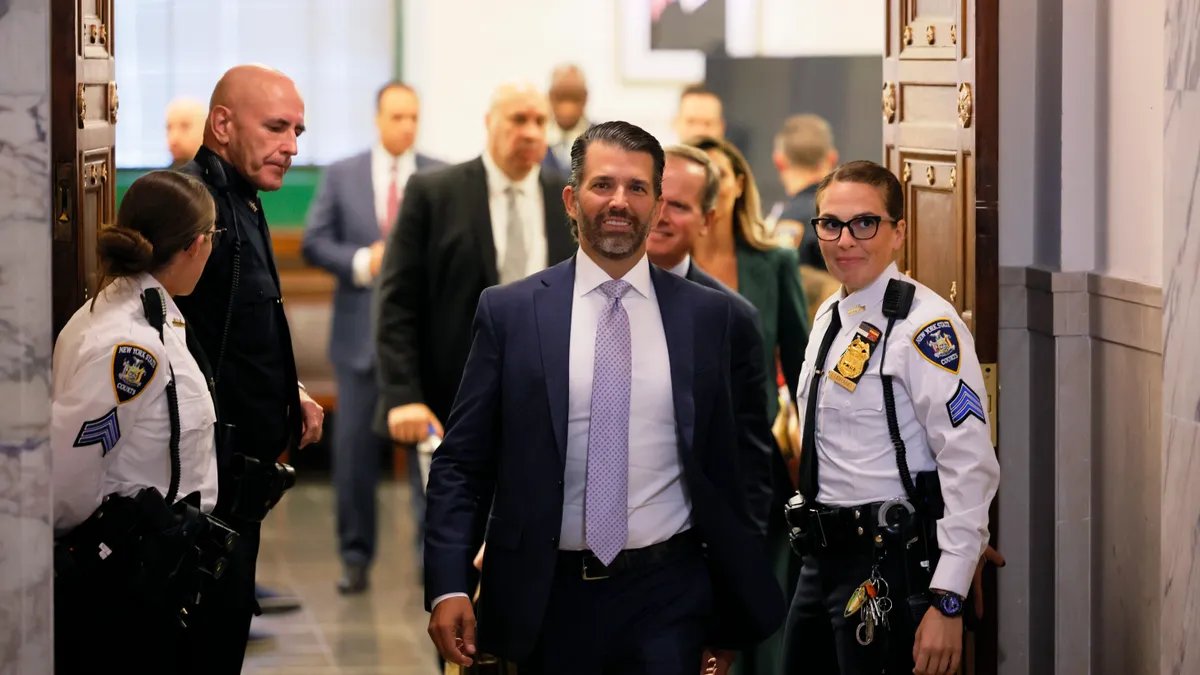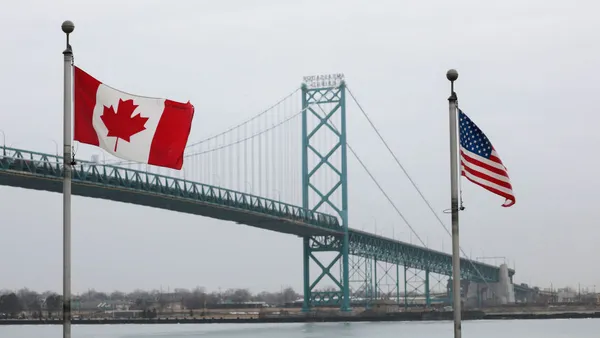Dive Brief:
- Donald Trump Jr. relied on former Trump Organization CFO Allen Weisselberg to relay pertinent financial information to him during their time as co-trustees for the Trump Revocable Trust, the former President’s son testified Monday as he took the stand for the defense in the New York Attorney General Letitia James’ $250 million civil fraud trial against the organization. The Trust is a business entity set up by Donald J. Trump to avoid potential conflicts of interest following his election as president.
- Weisselberg, who logged a near 50-year tenure at the Trump Organization, was present during the organization’s “coming of age” and was “very involved” in the business until he left in 2021, Trump Jr. testified in response to questions from Trump defense attorney Cliff Robert about Trump Jr.’s educational and professional background at the start of his Monday testimony.
- The bulk of Trump Jr.’s Monday testimony concerned the history of his father’s business after the defense was given leave by Judge Arthur Engoron to present a slide show of its history, which included key properties with valuations that have come under question throughout the trial.
Dive Insight:
The first witness called for the defense, Trump Jr. spoke only briefly of Weisselberg’s role and his relationship with the ex-CFO during his time on the stand Monday, largely speaking to the history of the Trump Organization and the impact his father, former President Donald Trump, had upon the real estate space.
Weisselberg’s authority remains a central question in the NY AG’s suit, which alleges that former President Donald Trump — alongside his two eldest sons and senior officials at the Trump Organization including Weisselberg — fraudulently inflated the former president’s net worth to obtain bank loans with more favorable terms than would have otherwise been available.
Prosecutors rested their case Wednesday, reserving the right to recall Weisselberg to the stand. Multiple members of the Trump family have laid responsibilities for the organization’s financial statements mainly at Weisselberg’s door. In testimony last week, former President Donald Trump was lukewarm about whether Weisselberg and former controller Jeff McConney did a “good job” preparing those statements.
The NY AG’s office alleges the Trumps were much more involved; however, asserting that Eric Trump was intimately involved in determining valuations for various Trump properties and that Trump Jr. continued to certify financial statements in his role as a trustee for the Trump Revocable Trust; Trump Jr. and Weisselberg served a stint as co-trustees of the trust.
Trump Jr.’s working relationship with Weisselberg, which he described as “largely positive,” did not change during the period they served as co-trustees between 2017 and 2021.
“We worked as a large family business; I had my buckets,” Trump Jr. said, noting that he would focus on licensing, for example, while Weisselberg managed internal financials and the organization’s relationships with its independent accountants.
Trump Jr. was previously not able to recall the circumstances of Weisselberg’s departure from the business during past questioning from prosecutors beyond that it dealt with “legal issues he got into.”
The former CFO left the organization after facing charges of tax fraud by the NY district attorney’s office, ultimately entering into a plea agreement which required Weisselberg to repay $1.99 million in taxes, penalties and interest. The terms of his $2 million severance agreement — signed after his guilty plea and including language barring him from disparaging his former employer — came under fire from the NY AG during the questioning of Eric Trump, who testified he had negotiated the severance terms.
Prosecutors and Trump’s attorneys clashed over questions of hearsay as the defense got underway, with state attorneys objecting that the slideshow containing information of the organization’s history was leading Trump Jr. as a witness.
“Having given you six weeks, you’re going to get me in trouble with Mr. Kise — he’s going to say I always rule against him,” Engoron said in allowing the presentation over the state’s objections, referencing previous courtroom spats with Trump attorney Chris Kise. Trump’s attorneys have repeatedly clashed with Judge Engoron as the case has continued; as has the former president, who derided the trial as a “disgrace” during witness testimony last week.
Trump Jr. on Monday lobbed criticism at some of the disputed property valuations that have cropped up over the course of the civil fraud trial such as the president’s Mar-a-Lago property in Palm Beach, Florida. The property’s value is now hotly debated, jumping anywhere from $18 million to $1 billion, according to an AP news report.
“That’s why I took umbrage about the stories of Mar-A-Lago being worth 18 million — you couldn’t build that atrium for 18 million dollars today,” Trump Jr. said when shown a picture of the space. In October, Judge Engoron ruled that the organization had inflated Mar-a-Lago’s value by as much as 2,300%, according to a CNN report.
State assistant AG Colleen Faherty pressed Trump Jr. about the current status of certain Trump properties in a brief cross-examination Monday, asking if he was aware that the occupancy rate of its 40 Wall Street property had dropped to 77% from the 90% Trump Jr. had testified earlier and that a luxury hotel in Hawaii was buying out its licensing agreement with the organization in favor of branding with Hilton.
“If they want to buy it out for millions of dollars, I’m okay with that,” Trump Jr. said of the Hawaii property in response to a question from Faherty about if the hotel was “ditching the Trump name.”
Trump Jr. projected a relaxed and light-hearted air Monday, joking with Judge Engoron throughout his time on the stand.
“I wouldn’t go to Scotland this time of year; let’s do that in July,” Trump Jr. quipped to the judge following a joke by defense attorney Robert that they would have arrange site visits rather than a slideshow but that it might have been difficult to get to international properties.
Engoron made clear Friday that he had already ruled on the fraud involved in valuation of the properties, going over what he called the “greatest hits” of properties that he cited at length in his September order, ranging from Trump’s own penthouse to 40 Wall Street.














